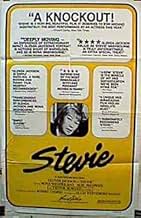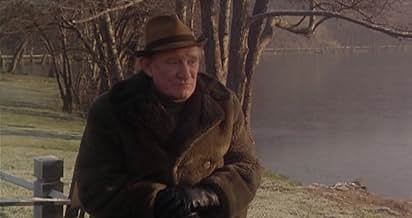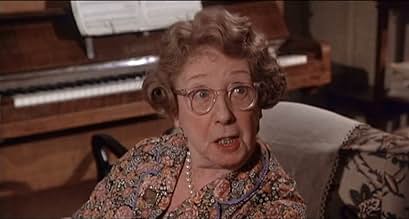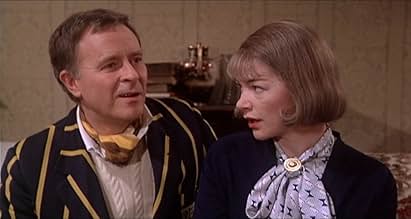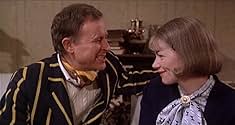Ajouter une intrigue dans votre langueThis biographical film has Glenda Jackson portraying a British poet with emotional problems.This biographical film has Glenda Jackson portraying a British poet with emotional problems.This biographical film has Glenda Jackson portraying a British poet with emotional problems.
- Réalisation
- Scénario
- Casting principal
- Nomination aux 1 BAFTA Award
- 8 victoires et 4 nominations au total
Avis à la une
Literate, lovely, sad film about the British poet/writer Stevie Smith with splendid performances by Glenda Jackson as Stevie and Mona Washbourne as the "lion aunt." Stagy, yes, but filled with love and wit and great wisdom.
The narrative follows the adult years of the eccentric poet in her suburban London home she shares with her aunt. Her workaday like is a background to her domestic life with flashbacks of school, a failed love, and death ... a major theme in her writing.
But rather than being gloomy, the film points out the joys of a life even if unfulfilled by husband and children. Jackson enacts many of Stevie's poems as a counterpoint to her own life, and she is quite superb.
Mona Washbourne is excellent and endearing as the aging aunt who really doesn't understand the Bohemian life of her gifted niece. Yet they have a wonderful life together. The domestic scenes of the simple joys of conversation and good sherry are wondrous.
Alec McCowen is the lost suitor. Trevor Howard is the narrator who wanders through the story.
A pity this is not available on DVD. A lovely film for the intelligent viewer.
The narrative follows the adult years of the eccentric poet in her suburban London home she shares with her aunt. Her workaday like is a background to her domestic life with flashbacks of school, a failed love, and death ... a major theme in her writing.
But rather than being gloomy, the film points out the joys of a life even if unfulfilled by husband and children. Jackson enacts many of Stevie's poems as a counterpoint to her own life, and she is quite superb.
Mona Washbourne is excellent and endearing as the aging aunt who really doesn't understand the Bohemian life of her gifted niece. Yet they have a wonderful life together. The domestic scenes of the simple joys of conversation and good sherry are wondrous.
Alec McCowen is the lost suitor. Trevor Howard is the narrator who wanders through the story.
A pity this is not available on DVD. A lovely film for the intelligent viewer.
This film betrays its stage origins at every turn, from the length of time it takes to get going to its asides to camera. Performances are strong throughout, particularly Glenda Jackson as Stevie Smith and Trevor Howard as the mysterious 'The Man', who speaks Smith's poems so brilliantly.
Jackson was a marvellous actress who left many performances on record before her decision to retire and become an MP; watching 'Stevie', you can see hints of her other roles ... and yet, because of make-up, script and setting it is so different to any of the others.
Tightly directed and economically filmed, 'Stevie' is a film which repays watching more than once. It should be more widely available.
Jackson was a marvellous actress who left many performances on record before her decision to retire and become an MP; watching 'Stevie', you can see hints of her other roles ... and yet, because of make-up, script and setting it is so different to any of the others.
Tightly directed and economically filmed, 'Stevie' is a film which repays watching more than once. It should be more widely available.
For a thoughtful, literate, positive essay on the film, see Ed Hirsch in American Poetry Review (Jul/Aug 2000): 32-37: ""It's deeply fitting that the last words of the film are the words of Stevie's final poem ["Come Death (a)," read by Trevor Howard]. They fill the mind, the theater, with their faithful summons, their fatal timely music.""
This is an appallingly boring film. Perhaps it was an interesting stage play...I don't know. But it doesn't work as a film because there is virtually nothing cinematic about it. It remains confined largely within the dimensions of a stage set (there is really only one set, a shabby-genteel apartment where "Stevie" (the real-life poet Stevie Smith) lives with her long-suffering aunt (played by Mona Washbourne). Stevie, you see, has problems---emotional problems, problems with her "muse," problems living with her dependent aunt, problems with lovers (one of them, Trevor Howard, bears the enigmatic name of "The Man.") And Stevie TALKS...all the time, a constant stream of arty, supposedly meaningful, but utterly self-indulgent jabber. Glenda Jackson plays "Stevie,"...she really liked talky parts, it would seem. This one fits her like a glove. She, Howard, Washbourne, and Alec McCowen are four of the finest actors Britain has produced. Yet they wallow in this mess for what seems like days (the film actually only runs a bit over the usual 90 minutes). Steer clear of this deadly dull bio-pic, unless you just can't do without the poetry and posturings of Stevie Smith, or you absolutely must see the entire "oeuvre" of Glenda Jackson, M.P.
There could never be a great film about Stevie Smith; the poet is simply too small, silly and self-absorbed, like her work - just the kind of poetry that seems to win awards, as hers did twice.
But smallness is the strength of this film, and its economy has been praised by many. Most of the action (mainly talk, in fact) takes place in one modest suburban front parlour, between Stevie and her deeply unpoetic Yorkshire aunt, played by Mona Washbourne, who comes a little too close to caricature, and does not quite measure up to Glenda Jackson, Trevor Howard or Alec McCowen, who comprise the rest of the minimal cast. Even at that, the two males are only allowed on-board as fringe-characters, McCowen as the hopeful young suitor Freddy, doomed to disappointment, and Howard as a mystery figure, known only as The Man, presumably an ex-lover, who recites a few of her poems with deep sincerity.
These poems display little virtue (rather like a poor man's Edith Sitwell), but they reveal an unusually deep preoccupation with death, alongside a confused and childish protest against middle-class values, as deeply embedded in the aunt's character. Her coining of the phrase 'Not waving but drowning' may yet survive as her epitaph.
Jackson carries full conviction as Stevie, having to act the same person from schooldays onwards, so we don't always know what age and stage we're at. She talks as though she's still in her teens when she visits Berlin with a German boyfriend at the beginning of the Nazi era, by which time Stevie would have been into her thirties.
Meanwhile she treats death as another character in the story, apparently welcoming the certainty of his arrival, and Howard reports that she died, unable to speak, but circling one word on a sheet of paper. The word was 'Death'.
But smallness is the strength of this film, and its economy has been praised by many. Most of the action (mainly talk, in fact) takes place in one modest suburban front parlour, between Stevie and her deeply unpoetic Yorkshire aunt, played by Mona Washbourne, who comes a little too close to caricature, and does not quite measure up to Glenda Jackson, Trevor Howard or Alec McCowen, who comprise the rest of the minimal cast. Even at that, the two males are only allowed on-board as fringe-characters, McCowen as the hopeful young suitor Freddy, doomed to disappointment, and Howard as a mystery figure, known only as The Man, presumably an ex-lover, who recites a few of her poems with deep sincerity.
These poems display little virtue (rather like a poor man's Edith Sitwell), but they reveal an unusually deep preoccupation with death, alongside a confused and childish protest against middle-class values, as deeply embedded in the aunt's character. Her coining of the phrase 'Not waving but drowning' may yet survive as her epitaph.
Jackson carries full conviction as Stevie, having to act the same person from schooldays onwards, so we don't always know what age and stage we're at. She talks as though she's still in her teens when she visits Berlin with a German boyfriend at the beginning of the Nazi era, by which time Stevie would have been into her thirties.
Meanwhile she treats death as another character in the story, apparently welcoming the certainty of his arrival, and Howard reports that she died, unable to speak, but circling one word on a sheet of paper. The word was 'Death'.
Le saviez-vous
- AnecdotesThe film was given a very limited release in the USA in late 1978, but only on the West Coast. Over two years later, it was shown theatrically on the East Coast and proved a big hit with critics, going on to win many awards, including 2 acting awards from the New York Film Critics.
- Citations
Stevie Smith: Agatha Christie is so deadly serious in English... but in French, she's so delightfully funny! Je m'apelle Hercule Poirot, un detective. Her murders are so polite!
Meilleurs choix
Connectez-vous pour évaluer et suivre la liste de favoris afin de recevoir des recommandations personnalisées
Détails
- Durée1 heure 42 minutes
- Mixage
- Rapport de forme
- 1.78 : 1
Contribuer à cette page
Suggérer une modification ou ajouter du contenu manquant


